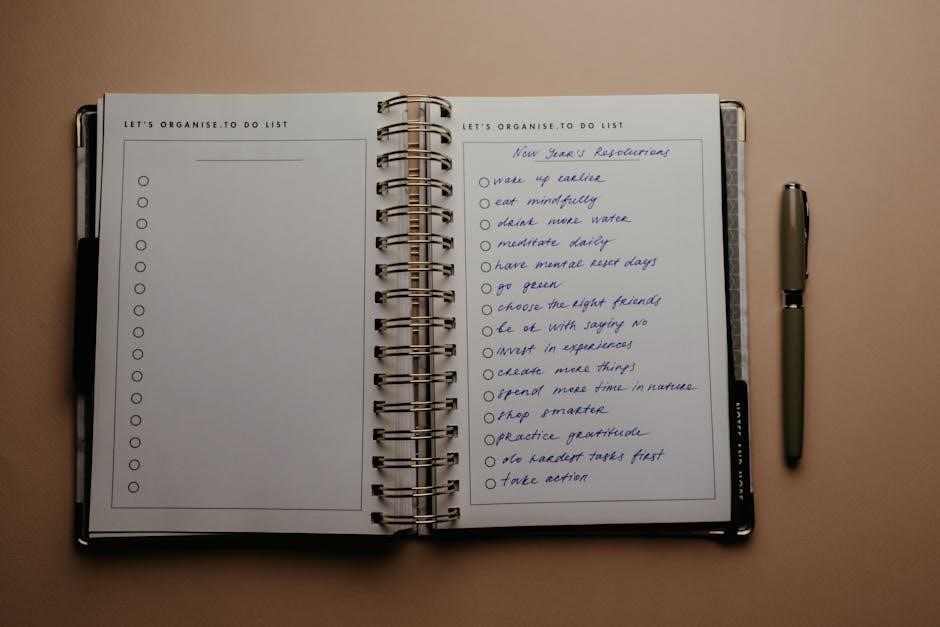The 7 Habits Worksheets are practical tools designed to help individuals apply Stephen Covey’s framework for personal development․ These resources guide users in reflecting on habits, identifying areas for improvement, and creating actionable plans to foster growth․
1․1 Overview of the 7 Habits Framework
The 7 Habits Framework, introduced by Stephen Covey, is a holistic approach to personal effectiveness․ It emphasizes proactive behavior, beginning with the end in mind, and prioritizing tasks․ The habits include being proactive, starting with a clear vision, managing time effectively, fostering win-win relationships, seeking understanding, synergizing, and self-renewal․ These principles guide individuals in aligning their actions with personal values, enhancing relationships, and achieving long-term goals․ The framework is interconnected, with each habit building on the previous one to create a foundation for lasting personal and professional growth․ Worksheets based on this framework help users apply these habits practically․
1․2 Importance of Worksheets in Personal Development
Worksheets are essential tools for applying the 7 Habits framework, offering structured exercises to reflect on personal growth․ They help identify areas for improvement, set actionable goals, and track progress․ By providing a space for self-reflection, worksheets empower individuals to align their actions with personal values․ They also make abstract concepts actionable, enabling users to focus on physical, mental, social/emotional, and spiritual growth․ These resources are invaluable for anyone seeking to implement the 7 Habits effectively, fostering accountability and clarity in their personal development journey․ Regular use of worksheets accelerates habit formation and sustains long-term positive change․
Habit 1 focuses on taking responsibility for your life and choices․ Worksheets help identify proactive behaviors, encouraging personal accountability and initiative to achieve goals effectively․ Proactive behavior involves taking initiative and responsibility for one’s actions and outcomes․ It emphasizes self-awareness, choice, and accountability․ Worksheets for Habit 1 guide users in identifying reactive patterns and shifting focus to proactive approaches․ By examining personal paradigms and practicing self-reflection, individuals can cultivate a mindset that embraces responsibility and initiative․ This foundational shift enables individuals to move beyond mere reaction to purposeful action, aligning their efforts with personal and professional goals․ The exercises encourage users to recognize their circle of influence and focus on what they can control, fostering a proactive lifestyle․ Worksheets for Habit 1 include exercises that help individuals recognize and embrace responsibility․ Activities focus on identifying areas where proactive choices can replace reactive behavior․ Users are prompted to reflect on personal accountability, list specific responsibilities, and create action plans to address challenges․ One exercise involves writing a personal mission statement, while another asks users to evaluate their circle of influence and prioritize tasks within it․ These tools empower individuals to take ownership of their lives, fostering a mindset of accountability and initiative․ Practical steps guide users in applying proactive principles to real-life scenarios․ This habit focuses on creating a clear vision for personal and professional life․ Worksheets guide users in defining a mission statement and aligning goals with core values․
A personal vision statement is a powerful tool for clarifying life’s purpose and goals․ Worksheets provide prompts to reflect on core values, long-term aspirations, and priorities․ Users are guided to draft a concise statement that serves as a roadmap for decision-making and personal growth․ This exercise helps individuals align daily actions with their overarching mission, fostering a sense of direction and purpose․ By defining a clear vision, one can better prioritize efforts and stay focused on what truly matters․ This step is foundational for effective goal-setting and habit development․ The long-term goals worksheet helps individuals break down their vision into actionable objectives․ It guides users in identifying specific, measurable goals aligned with their personal mission․ By categorizing goals into life areas like career, relationships, and health, the worksheet ensures a balanced approach․ Users are prompted to set target dates and evaluate progress, fostering accountability․ This tool encourages prioritization and focus, ensuring efforts align with core values․ Regular reflection and adjustment are emphasized, making it easier to stay on track and achieve lasting success․ The worksheet is a cornerstone for translating vision into reality․ This habit focuses on effective time management and prioritization․ It encourages individuals to schedule tasks based on importance and urgency, ensuring alignment with personal values․ Time management and prioritization are cornerstone skills for effectiveness․ The 7 Habits framework emphasizes organizing tasks by importance and urgency․ By focusing on what truly matters, individuals can reduce stress and boost productivity․ Worksheets often include a prioritization matrix, helping users categorize activities into four quadrants: urgent and important, important but not urgent, urgent but not important, and neither․ This tool encourages aligning daily tasks with long-term goals, fostering a balanced and purpose-driven lifestyle․ Regular practice with these exercises helps develop disciplines that lead to greater control over time and energy․ The weekly schedule template is a powerful tool for organizing time and tasks․ It helps users plan their days with purpose, aligning activities with long-term goals․ The template typically includes sections for daily priorities, key responsibilities, and time blocks․ By scheduling tasks based on importance and deadlines, individuals can manage their workload more efficiently․ The template also allows for reflection and adjustment, ensuring a balanced approach to productivity․ Regular use of this tool fosters discipline and accountability, making it easier to stay focused on what truly matters․ It’s a practical way to turn time management into a habit for lasting effectiveness․ The weekly schedule template helps individuals organize tasks and time, aligning activities with long-term goals․ It includes sections for daily priorities and responsibilities, promoting efficient time management and productivity․ By scheduling tasks based on importance and deadlines, users can maintain focus on what truly matters․ Regular use fosters discipline and accountability, making time management a habit for lasting effectiveness․ An abundance mentality fosters the belief that success and resources are plentiful, encouraging collaboration over competition․ Worksheets for Habit 4 guide users in reflecting on relationships and opportunities where everyone can benefit․ By identifying win-win scenarios and practicing empathy, individuals cultivate trust and mutual respect․ These exercises help shift focus from scarcity to shared success, promoting a mindset that values long-term relationships and collective growth․ This approach not only strengthens personal and professional connections but also aligns actions with ethical and principled behavior, fostering a culture of cooperation and mutual benefit․ This worksheet helps users cultivate strong, meaningful connections by focusing on empathy and mutual understanding․ It includes exercises to identify positive interactions, reflect on communication styles, and practice active listening․ Users are prompted to list ways to show appreciation and resolve conflicts constructively․ The worksheet also encourages setting goals to strengthen relationships, fostering a win-win approach in personal and professional interactions․ By applying these strategies, individuals can build trust, enhance collaboration, and create a supportive network that aligns with the principles of Habit 4: Think Win-Win․ This tool empowers users to nurture relationships effectively․ This habit emphasizes effective communication by prioritizing empathy and active listening․ Worksheets guide users in practicing understanding others’ perspectives before seeking to be understood, fostering deeper connections․ Improving communication skills is central to Habit 5․ Worksheets provide exercises to enhance active listening and empathy, encouraging users to pause before reacting and choose thoughtful responses․ By reflecting on personal interactions and identifying areas for growth, individuals can develop deeper understanding and more meaningful connections․ These tools help bridge communication gaps, fostering environments where both parties feel heard and valued․ Regular practice with these exercises leads to improved relationships and more effective dialogue in personal and professional settings․ The Active Listening Exercise Worksheet is designed to enhance understanding and empathy in interactions․ It includes prompts to practice reflecting, clarifying, and asking open-ended questions․ Users are guided to identify personal communication habits and areas for improvement․ The worksheet encourages focused attention on others’ perspectives, reducing misunderstandings․ By regularly using this tool, individuals can develop deeper connections and more effective communication skills․ This resource is an essential component of Habit 5, fostering a culture of understanding and respect in both personal and professional relationships․ Habit 6 focuses on collaboration, combining diverse perspectives to create innovative solutions, fostering effective teamwork and mutual success in achieving collective goals․ Synergy emerges when individuals collaborate, blending unique strengths and ideas to achieve outcomes greater than individual efforts․ Worksheets encourage identifying collaboration opportunities, fostering open communication, and valuing diverse perspectives to unlock creative solutions and shared success․ Teamwork and synergy-building activities foster collaboration and mutual understanding․ Worksheets include exercises like brainstorming sessions, group problem-solving, and shared goal setting․ These activities encourage individuals to value diverse perspectives, leading to innovative solutions․ By working together, teams learn to leverage strengths and overcome weaknesses, creating a supportive environment for growth․ Synergy is achieved when the collective outcome exceeds individual contributions, enhancing creativity and productivity․ These exercises help build trust, communication, and respect, essential for effective teamwork and long-term success․ Habit 7 focuses on self-care and personal renewal across the four key dimensions: physical, mental, social/emotional, and spiritual․ Regular reflection and self-renewal ensure personal effectiveness and balance, fostering long-term well-being and growth․ Self-care and personal renewal are vital for maintaining balance and effectiveness․ Worksheets for Habit 7 guide users to assess their well-being across physical, mental, social/emotional, and spiritual dimensions; By identifying areas needing attention, individuals can create tailored plans to rejuvenate and strengthen these aspects of their lives․ Regular reflection and intentional self-care practices help prevent burnout, fostering resilience and continuous personal growth․ These exercises encourage holistic health, ensuring that individuals are fully equipped to embrace life’s challenges with energy and purpose․ The Balancing the Four Key Dimensions Worksheet helps individuals assess and harmonize their physical, mental, social/emotional, and spiritual well-being․ Users reflect on each dimension, identifying strengths and areas for improvement․ The worksheet guides goal-setting and provides space for tracking progress, ensuring a holistic approach to self-care․ By focusing on renewal and balance, this tool supports sustained personal growth and effectiveness․ Regular use promotes awareness and intentional habits, fostering a life of purpose and fulfillment across all life areas․ The four key dimensions of life—physical, mental, social/emotional, and spiritual—are essential for holistic personal development․ They provide a framework for balancing health, growth, relationships, and values․ The physical dimension focuses on maintaining health and wellness through regular exercise, balanced nutrition, and sufficient sleep․ Worksheets in this area guide users to assess their current habits and set realistic goals for improvement․ Activities include tracking daily exercise routines, planning meals, and creating schedules to ensure adequate rest․ By prioritizing physical health, individuals build the energy and resilience needed to pursue personal and professional goals effectively․ These practices lay a strong foundation for overall well-being and support the development of the other dimensions․ The mental dimension emphasizes the importance of intellectual growth through continuous learning and self-reflection․ Worksheets in this area encourage users to set goals for reading, learning new skills, and engaging in mentally stimulating activities․ They also prompt individuals to reflect on their thought patterns and beliefs, fostering a mindset of curiosity and adaptability․ By nurturing intellectual growth, individuals enhance their problem-solving abilities and stay open to new ideas, which supports personal and professional development․ This dimension reinforces the habit of sharpening the saw by prioritizing mental renewal and expansion․ The social/emotional dimension focuses on fostering healthy relationships and emotional intelligence․ Worksheets in this area help users assess their communication skills, empathy, and ability to build trust․ Activities include identifying ways to strengthen relationships, practicing active listening, and resolving conflicts constructively․ By cultivating emotional awareness and positive interactions, individuals can create supportive networks and collaborative environments․ This dimension aligns with habits like “Seek First to Understand” and “Think Win-Win,” encouraging harmony and mutual respect in personal and professional relationships․ Nurturing this dimension enhances emotional well-being and interpersonal effectiveness․ The spiritual dimension revolves around personal values and purpose, guiding individuals to align their actions with their core beliefs․ Worksheets in this area help users reflect on their mission statement, life’s purpose, and ethical standards․ Activities include identifying personal values, assessing alignment with daily actions, and setting goals to live authentically․ This dimension is tied to “Begin with the End in Mind,” encouraging a life of integrity and meaning․ By nurturing this dimension, individuals gain clarity, purpose, and a strong moral compass, leading to fulfillment and inner peace․ It’s about living a life that truly reflects who they are․ The 7 Habits Worksheets provide structured guidance for setting and achieving personal and professional goals․ They help users assess current habits, identify areas for improvement, and create actionable plans aligned with their vision and values․ The 7 Habits Worksheets offer a structured approach to identifying personal and professional goals․ Users are prompted to reflect on their values, vision, and priorities, ensuring alignment between their objectives and long-term aspirations․ By categorizing goals into physical, mental, social/emotional, and spiritual dimensions, individuals can create a holistic plan․ The worksheets encourage setting SMART (Specific, Measurable, Achievable, Relevant, Time-bound) goals, fostering clarity and focus․ This process helps individuals prioritize effectively, balancing personal growth with professional success, and ensures that their efforts contribute meaningfully to their overall life mission․ The 7 Habits Worksheets include an action plan template to help individuals turn their goals into concrete steps․ This tool enables users to break down objectives into manageable tasks, assign responsibilities, and set realistic deadlines․ By aligning actions with their personal mission and values, individuals ensure their efforts remain purpose-driven․ The template also includes space for tracking progress, fostering accountability and motivation․ This structured approach empowers users to move from planning to execution, ensuring their goals are achievable and aligned with the principles of the 7 Habits framework․ Regular reviews and adjustments are encouraged for continuous improvement․ The 7 Habits Worksheets are available as free PDF downloads, offering structured exercises for personal reflection and goal-setting․ These printable resources include vision statements, goal templates, and progress trackers, designed to align with each habit․ Users can easily customize them to suit their personal or professional needs, making them versatile tools for individual growth and development․ Available online, these resources provide a practical starting point for anyone looking to adopt the 7 Habits framework in their daily life․ The 7 Habits Worksheets are accessible as free PDF downloads, offering a comprehensive guide for personal development․ These resources include vision statements, goal templates, and progress trackers, designed to align with each habit․ Users can easily customize them to suit their personal or professional needs, making them versatile tools for individual growth and development․ Available online, these resources provide a practical starting point for anyone looking to adopt the 7 Habits framework in their daily life․ They are perfect for educators, professionals, and individuals seeking structured exercises for self-improvement․ The 7 Habits Worksheets offer customizable templates tailored to individual preferences and goals․ These adaptable resources cater to diverse needs, whether for personal growth, education, or professional development․ Users can modify sections to focus on specific habits, such as time management or relationship-building․ Educators and professionals appreciate the flexibility, as they can tailor templates for students or team members․ The ability to personalize content ensures the worksheets remain relevant and effective for various audiences, making them invaluable tools for fostering habit development across different contexts and requirements․ This adaptability enhances their practicality and user engagement․ Start by integrating one habit at a time, using worksheets to track progress․ Align daily actions with the 7 Habits framework for lasting change and growth․ Start with self-assessment using worksheets to identify areas needing improvement․ Focus on one habit at a time, setting specific, measurable goals․ Create a daily routine incorporating habit practices, such as proactive planning or active listening․ Track progress weekly using templates to stay accountable․ Reflect on challenges and celebrate small wins to maintain motivation․ Share goals with a trusted partner for added support․ Gradually integrate all seven habits to build a balanced, effective lifestyle․ Consistency and patience are key to lasting change and personal growth․ Worksheets are invaluable for monitoring progress in habit development․ Regularly review habit trackers to assess improvements and identify areas needing more focus․ Use goal-setting templates to break down objectives into manageable steps․ Reflect on weekly schedules to ensure alignment with priorities․ Progress tracking fosters accountability and provides a clear view of growth over time․ Celebrate milestones to stay motivated and adjust strategies as needed․ Consistent use of these tools enhances self-awareness and helps maintain momentum on the journey to adopting the 7 Habits․ Visibility of progress encourages persistence and long-term success․ The 7 Habits Worksheets provide a clear, structured approach to personal development, helping users assess their habits, set goals, and track progress․ They enhance self-awareness, improve time management, and foster positive relationships․ By focusing on the four key life dimensions—physical, mental, social/emotional, and spiritual—these tools empower individuals to create a balanced, effective lifestyle․ The worksheets’ practical exercises and reflective prompts make them invaluable for anyone seeking personal growth and long-term effectiveness․ They are accessible, customizable, and serve as a powerful resource for implementing the 7 Habits framework in daily life․ Embrace the transformative power of the 7 Habits Worksheets and take the first step toward personal growth․ These tools offer a clear path to self-improvement, helping you cultivate effectiveness in all areas of life․ With free, customizable resources, you can begin your journey at your own pace, reflecting on your habits and setting meaningful goals․ The structured framework provides balance and clarity, empowering you to prioritize what truly matters․ Don’t wait—start today and unlock a life of purpose, synergy, and fulfillment․ The worksheets are your guide to a brighter, more intentional future․ Begin now and see the difference!Habit 1: Be Proactive
2․1 Understanding Proactive Behavior
2․2 Worksheet Activities for Taking Responsibility
Habit 2: Begin with the End in Mind
3․1 Creating a Personal Vision Statement
3․2 Setting Long-Term Goals Worksheet

Habit 3: Put First Things First
4;1 Time Management and Prioritization
4․2 Weekly Schedule Template for Effectiveness
Habit 4: Think Win-Win
5․1 Developing an Abundance Mentality
5․2 Building Positive Relationships Worksheet
Habit 5: Seek First to Understand, Then to Be Understood
6․1 Improving Communication Skills
6․2 Active Listening Exercise Worksheet

Habit 6: Synergize
7․1 The Power of Collaboration
7․2 Teamwork and Synergy-Building Activities
Habit 7: Sharpen the Saw
8․1 Self-Care and Personal Renewal
8․2 Balancing the Four Key Dimensions Worksheet
The Four Key Dimensions of Life
9․1 Physical Dimension: Health and Wellness
9․2 Mental Dimension: Intellectual Growth
9․3 Social/Emotional Dimension: Relationships
9․4 Spiritual Dimension: Personal Values

Goal Setting with 7 Habits Worksheets
10․1 Identifying Personal and Professional Goals
10․2 Creating an Action Plan Template

Printable Resources for the 7 Habits
11․1 Free PDF Worksheets Available Online
11․2 Customizable Templates for Different Needs
Implementing the 7 Habits in Daily Life
12․1 Practical Steps for Habit Development
12․2 Tracking Progress with Worksheets
13․1 Summary of the Benefits of 7 Habits Worksheets
13․2 Encouragement to Start the Journey
